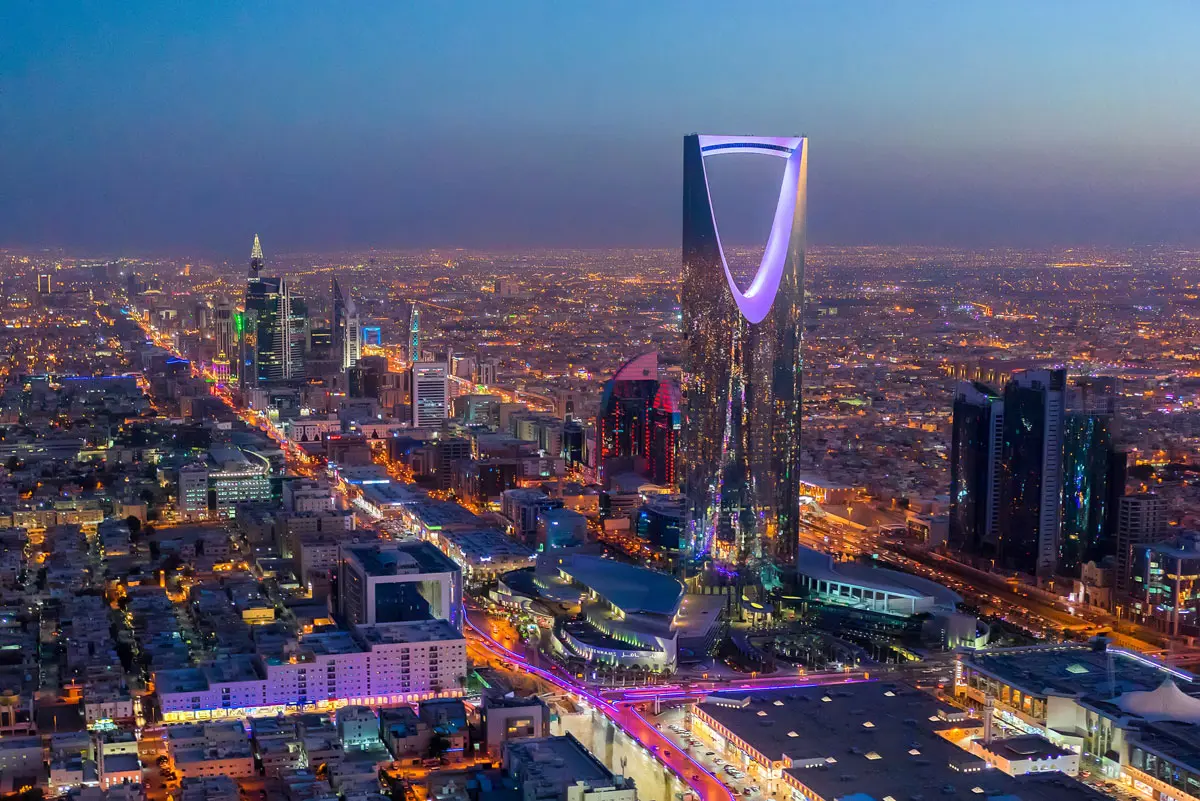Blog
How to Start your Business in Saudi Arabia
Establish a 100% foreign owned company in the KingdomAlthough Saudi Arabia has been a difficult challenge for companies looking to establish operations there, things have changed in recent years and even more so in recent months. This is because today, the Saudi government openly welcomes investments from foreign firms as part of its Vision 2030 plan, a strategic framework to reduce the Kingdom’s reliance on oil, diversify the economy, and develop a bustling private sector. By opening up the Kingdom to the world and removing many of the barriers that existed, the Saudi government aims to position the country to become a key player on the world stage.Benefits of Starting a Business in Saudi ArabiaThe Kingdom’s attractiveness as a prospect to any savvy business owner is not just limited to the nation’s openness to foreign investments or physical location within the Middle East, but it is because the country provides:Attractive property solutions across 35 rapidly growing cities and commercial hubs.Supply of industrial land and commercial real estate at competitive prices.A young and skilled workforce (50% of the country’s population is under 25 years old).One of the safest places in the world with a high-quality healthcare system.Despite the easing of restrictions, however, starting a business in Saudi Arabia is not simply a case of registering it online and opening up shop. There is a set process that must be followed and, as with any major business decision, there are some considerations that need to be made by business owners that are thinking about expanding into the region.Local Knowledge is KeyYou must have good knowledge of Saudi Arabia and the wider region. To that end, you must be prepared to undertake lots of research in not only the country and the Middle East but also the industry or sector where your business aims to operate in. Although you may be an expert in your industry expert in your home country, the Kingdom will prove to be entirely different.On top of having local sector knowledge, you will also need a solid business plan which includes a study and analysis of the market conditions, potential competitors, and your forecast. You must also be prepared to search for and secure investment via your own resources, however, the rules on access to capital for foreign firms have been relaxed recently.Requirements To Start a Business in Saudi Arabia For Foreign CompaniesTo ensure the eligibility and ability of any foreign business owners to invest in Saudi Arabia, bringing sufficient experience to establish a sustainable business that adds value to the Saudi economy, you must have:A registered business outside KSA that is operation for at least one yearAn audited financial statement for your company for the same periodHowever, The government of Saudi Arabia categorically supports individual entrepreneurs who own intellectual property rights and documented patents from internationally or locally recognized entities, by providing them the opportunity to establish their business without the need for having an existing company outside the Kingdom. It is only in this case you will be issued investment license under the entrepreneurial category to start your Saudi based business.What Is The Process To Start a Business in Saudi ArabiaOnce you have thought about those three considerations and have everything in place, you can get started with the official formalities. The entire process can be summarized in the following steps…Prepare all your documents and submit them to the Saudi consulate.Submit your application to the Ministry of Investment of Saudi Arabia (MISA; previously the Saudi General Investment Authority (SAGIA)) for your company’s investment license.Obtain approval from the Ministry of Commerce and Industry after submitting your company’s name and Articles of Association.Sign the Articles of Association in front of a notary public.Publish the Articles of Association and company name in the official gazette.Open a bank account, transfer share capital, and obtain a certificate that states this capital has been deposited.Register with the General Department of Passports, Ministry of Interior, and Ministry of Labor for work/residence visas for any foreign workers (e.g. business owners and managers).Register with the Ministry of Commerce and Industry and the local Chamber of Commerce.Obtain a file number and certificate of business commencement. This is done by registering with the Department of Zakat and Income Tax and Ministry of Finance.Register with the General Organization of Social Insurance.How tawazon Can Help You Starting Your Business in Saudi Arabia!As you can see, there is quite a lot involved with starting up a business in Saudi Arabia. This is because the Saudi government, while keen to encourage foreign investments, wants to protect the Kingdom and its people from unscrupulous businesses. As a result, the business registration process is relatively long and thorough.At tawazon, however, we streamline the process of helping you set up your business with our range of professional business consultancy and registration services. Our in-house experts are specialized in bringing businesses like yours to the Saudi market, handling the entire process from start-to-finish so that you have more time to focus on what’s important—managing your business.With our turnkey solution, you can benefit from access to the Saudi market without any barriers or obstacles in the shortest possible time. If you want to learn more about how we can tawazon your expectations, contact the team today!
Read MoreHow Can I Invest in Saudi Arabia?
Market regulations paves the way for lucrative opportunitiesIn recent years, flows of foreign direct investment (FDI) to Saudi Arabia have followed a downward trend due to slumping oil prices and political factors. However, thanks to recent economic diversification efforts and government backed projects outside of the oil and gas sector such for example ‘Vision 2030’ and the ‘National Transformation Programme—FDI inflows have recovered.According to United Nations Conference on Trade and Development (UNCTAD) World Investment Report 2019, the Kingdom’s FDI went up by more than 120% between 2017 and 2018, reaching a figure of $3.2 billion. Much of this increase is because Saudi Arabia has opened up four major industries to foreign investment: Employment Services, Real Estate, Media services, and Land Transport Services.How To Invest in Saudi Arabia?Although Saudi Arabia presents plenty of opportunities for businesses that want to benefit from expanding to a whole new world, there is a process that needs to be followed.Although the country has opened up massively to FDI in recent years, unfortunately, establishing your business in Saudi Arabia is not as simple as going online and filling out a form to register it. There is still a strict process and framework that all foreign businesses must follow to the letter including applying for any relevant licenses or permits, going through the Saudization process, and opening a Saudi bank account, amongst other things.You also need to engage with multiple government entities, including but not limited to, the Ministry of Investment of Saudi Arabia (MISA, formerly known as SAGIA), the Ministry of Commerce and Investment (MCI), the Chamber of Commerce (CoC), and the General Authority of Zakat and Tax (GZAT).What Is the Process to Invest in Saudi Arabia?Due to all recent changes, the investment process, looks very different today than it did just a few years ago. Although the exact process differs from one industry to another and is relatively circumstantial, it can be summarised in five steps:You apply for and acquire a MISA license as they governs all FDI in KSA.You incorporate your company and get your Commercial Registration.You obtain your General Manager’s Visa from the Saudi Embassy.You register your company with relevant government bodies, your city’s Chamber of Commerce and open a bank account.Finally, you open your business officially by investing in real estate to begin trading.Why Invest in Saudi Arabia?There are many reasons why foreign businesses should consider investing in Saudi Arabia. The country’s controlled inflation rate, stable exchange rate, openness to foreign capital in upstream gas, in addition to its extensive privatisation initiatives, are among the most advantageous positives that are currently bringing an influx of FDI into it. In addition to this, the country’s strong banking sector helps drive the growth of many industries and access to the world’s largest oil reserves, low energy costs, and a high standard of living are all an added bonus.Today, Saudi Arabia is undergoing a transformation from a public sector-based, oil-dependent economy to an economy that is more balanced and built upon the successes of a thriving private sector. By 2030, the Saudi government hopes to increase the country’s private sector contribution to GDP to 65%, up from its current contribution of approximately 40%, and there are reasons why your business should be a part of this and reap some of the rewards, such as:Attractive property solutions across 35 rapidly growing cities and commercial hubs.Supply of industrial land and commercial real estate at competitive prices.A young and skilled workforce (50% of the country’s population is under 25 years old).One of the safest places in the world with a high quality healthcare system.A stable monetary system and a well capitalised financial sector.Zoned cities that are operated by a master developer for maximised investment potential.The New Attitude Towards FDI in Saudi ArabiaThe Saudi government has recently invested heavily in national infrastructure to attract foreign direct investment as it is considered to be one of the most important means for economic diversification. This is because FDI provides untapped employment opportunities for the country’s younger generations. To this extent, many barriers that once stood in the way of foreign investment, such as political and social tensions, restricted access to credit, and the ‘Saudization’ policy, have been relaxed.Today in Saudi Arabia, the authorities openly welcome FDI due to its ability to bring new technologies to the country, employ and train the national workforce, and boost economic development. Credit to this new positive attitude towards FDI, Saudi Arabia ranked 62nd out of 120 economies as per the World Bank’s 2020 Doing Business Report. This is a great boost upwards from 92nd position in 2019. Saudi Arabia was also ranked as the world’s best improver on the list.As time goes by, there is no doubt that Saudi Arabia will start to climb higher and higher on this list as attitudes change and more FDI flows in.Let Us tawazon Your ExpectationsDue to all the work involved, the process of investing in Saudi Arabia can be long and drawn out. And because of different customs, laws that seem more ‘restrictive’ and the way processes are handled in generally Saudi Arabia is different from most of the Western world, it can be difficult for business owners to handle everything alone.At tawazon, we specialise in bringing businesses like yours to the Saudi market and give it the very best chance of initial approval and ongoing success. With our turnkey solution, you can be free to focus on your day-to-day operations while we handle the entire process of establishing your business in Saudi Arabia, from start-to-finish.
Read MoreSaudi Arabia, The Hub of Business Cities
The Best Cities for foreign investment in the KingdomIn the early 2000s, Saudi Arabia saw a significant surge in prosperity due to the rising oil and increased demand for its resources worldwide. Drawing on the country’s abundant natural oil supply, the oil boom launched the Kingdom into becoming one of the most prosperous countries with advanced economies.However, the Kingdom cannot rely on this resource in perpetuity; the oil collapse and other economic woes means that, while remaining strong and stable in the short-term, the Saudi government must find an alternative way for sustainable economic growth.To hedge an oil based economy, the Saudi government has set out its Vision 2030 goals. Part of this vision is to develop ‘economic cities’ throughout the Kingdom. These cities will focus on growth through non-oil based private sector businesses, especially considering that this sector is forecasted for incredible growth over the next few years, leading the country’s economic expansion.Key Principles for the Kingdom’s Business CitiesDeveloped Based on Globally Competitive AdvantageEach city will be developed around at least one globally competitive cluster or industry and will serve as an anchor and a growth engine for the city.‘Hard’ and ‘Soft’ InfrastructureThe business cities will utilise opportunities for commercial development to adopt state-of-the-art technology solutions, making them truly competitive on a global scale.Creating Private Sector OpportunitiesEach city will be developed by the private sector for the private sector, therefore, creating many investment opportunities across segments like infrastructure, real estate, etc.Attracting Core JobsBy identifying and attracting the right investors, core jobs will be created to help expand the creation of other supporting service jobs.Attracting the Right PeopleTo achieve the government’s high aspirations in terms of job creation and investment volume, the Kingdom’s business cities need to offer attractive lifestyle to grow beyond a mere industrial free zone.Creating a Business-friendly EnvironmentAll business cities benefit from a business-friendly regulatory environment which is competitive to other free zones globally.The Kingdom’s Most Prominent Cities for Outside InvestorsHere are four of Saudi Arabia’s most prominent business cities that are predicted to grow rapidly through the nation’s ongoing city development plans that are taking place in 2020 and beyond.1. RiyadhAs the nation’s capital, Riyadh is the most populous city in the Kingdom and is already one of the country’s (and indeed the world’s) fastest-growing cities. Riyadh is located at the centre of the Arabian Peninsula and is home to more than 6 million people, expected to rise to 8 million by 2030.Not only is it huge in terms of its population, but its rapid income growth and urbanisation make it a hotspot for foreign investors. Building the city’s economy will coincide with Saudi Vision 2030’s goals to lower the rate of unemployment from 11 percent to 7 percent as well as move into the world’s 15 top largest economies.2. JEDDAHJeddah is home to more than 4 million people and is the country’s second most populous city behind Riyadh. Located on the coast, Jeddah houses the largest port in the Red Sea, automatically making it a critical hub for business opportunities in the Kingdom.In addition to its thriving population, Jeddah sees millions of religious tourists pass through it each year as they travel for the Islamic Pilgrimage (Hajj) to Makkah, and Medina. As part of Vision 2030 plans, the entire city of Jeddah is undergoing a facelift with the installation of new infrastructure, the upgrading of the King Abdul Aziz International Airport.3. KING ABDULLAH ECONOMIC CITY (KAEC)KAEC is one of the country’s new economic mega-cities that are being built from the ground-up. These cities are expected to bring rapid expansion and unprecedented economic expansion to the nation. KAEC is located less than 30 miles south of Rabigh along the coast of the Red Sea and will cover more than 170 square kilometers of land when construction is complete.Features of KAEC will include residential areas, a holiday resort, financial and education zones, a world-class seaport, and an industrial city. When it is complete and operational, KAEC is projected to be worth US$27 billion in investment value and support a population of over 2 million.4. JAZANJazan is a city that focuses on heavy industry. Like KAEC, Jazan is located on the coast along the Red Sea in the Southwestern region of the Kingdom. It will support a population of 250,000 when it is finished and include a seaport, agriculture distribution centre, fisheries area, and a health and education area. The Saudi government foresees Jazan as one of the country’s major epicentres for energy intensive industry and a vital hub for business.How to Choose the Right CityNow is the time to develop business relations in Saudi Arabia and become part of the Kingdom’s developing global market. However, choosing the right city and getting started can be difficult for uninitiated foreign investors, that is where tawazon comes in.We simplify the process of setting up your business with our range of professional business consultancy from seasoned experts in Saudi Arabia. We provide a turnkey service that handles the entire process from start to finish on behalf of your business and can provide advice in areas such as where the best city for your business is, or where its most valuable investment opportunities can be found.If you want to learn more, contact a member of our team today!
Read MoreSaudization: What New Saudi Businesses Need to Know
Saudi Arabia is very quickly becoming a popular place for foreign investment, with many exciting international corporations, and promising start-ups taking advantage and reaping the benefits of operating in the Middle East’s most lucrative commercial hub.Encouraged by consistent economic growth and the Saudi Government's 'Vision 2030' objectives, businesses have begun to recognize that now is the best time to make a name for themselves in Saudi Arabia and consequently the Middle East as a whole.If you are considering opening your business in Saudi Arabia, there are a few things you need to know, one of which is the government mandate called Saudization.Saudization: Helping Create a Dynamic and Competitive WorkforceSaudization is a policy move by the country’s Ministry of Labour that aims to put the interests of Saudi citizens first in the form of more employment prospects. It is planned that through Saudization the nations unemployment level will decrease from 12% to 7% over the coming yearsSo, What Is Saudization?It is an essential part of operating your Saudi business as it forms part of the core ‘process’ that all Saudi businesses, both foreign and local must follow.Historically, Saudi firms would bring in labour from other countries and prioritize those people rather than acquire employees from the Saudi talent pool. The point of Saudization is to balance the workforce and increase Saudi Arabia’s employment rates.Part of the Vision 2030 reforms that were announced in 2016, Saudization places an obligation on private corporations and enterprises to fill up their workforces with Saudi citizens up to a certain quota. This quota varies depending on a company’s size and its industry.Saudization Quotas—The 'Nitaqat Quota Threshold'Saudization uses a rating system called Nitaqat that classifies companies into four different categories:RedYellowGreen (Light, Medium, and Dark)Platinum‘Compliant’ zones (companies with enough Saudi employees) are banded in platinum and green. Whereas ‘non-compliant’ ones (companies without enough Saudi employees) are banded in yellow and red.Compliant platinum and green-zoned companies obtain several benefits that non-complaint yellow and red-zoned companies do not.Some of these benefits include being able to obtain expedited work permits and visas for foreign employees, being able to change their foreign employees’ professions, and being able to poach employees from red and yellow-zoned companies the need for permission from previous employers.In contrast, yellow and red-zoned companies face many restrictions and cannot issue any Saudization certificates, an essential part of the process that is required to be compliant with Saudi laws.Yellow-zoned companies, for example, cannot renew work visas for employees who have remained in Saudi Arabia for more than two years. They also cannot issue new work permits or visas. Red-zoned companies cannot hire any expats as employees, open new businesses or branches in Saudi Arabia, and cannot renew work permits.How Many Saudi Employees is 'Enough'?As we mentioned earlier, that depends on your company’s size and its industry. Saudi authorities have defined company sizes as follows:Small A: 0 – 5 employeesSmall B: 6 – 49 employeesMedium A: 50 – 99 employeesMedium B: 100 – 199 employeesMedium C: 200 – 499 employeesLarge: 500 – 2,999 employeesGiant: 3,000+ employeesThe percentage of these employees that must be Saudi nationals varies from industry to industry, and the Saudi Government has defined over 70 different types of industry for the purpose of Saudization rules.In the IT sector, for example, small companies must have a 56% Saudi workforce to be considered a Platinum company whereas medium-sized companies must have a 64% Saudi workforce to also be in the Platinum band. The bare minimum Saudi workforce, however, to avoid the dreaded Yellow zone for small and medium-sized IT companies is 20% and 29% respectively.Saudization is a Key Consideration for YouIf you are considering moving your company to Saudi Arabia, you should hopefully now have a basic understanding of the Saudization process—it is a major part of operating here and you must meet your obligations to extract maximum benefit from your Saudi enterprise.At tawazon, we provide a comprehensive consultancy and advisory service that makes the entire process simple. From taking your first steps to opening your Saudi company’s doors and hiring Saudi nationals, we can advise on and handle everything on your behalf. If you would like to learn more, contact us today!
Read MoreUsing tawazon to Establish Your Company in Saudi Arabia
Presently, the Saudi market is a very lucrative Middle Eastern market, the credit for which goes to the government’s Vision 2030. The sole aim of this vision is to reduce the nation’s dependency on oil and diversify its economy through development of key public sectors.Today Saudi Arabia is open to all types of business enterprise where foreign nationals can own 100% of the Saudi registered companies. While there are certain process you need to follow to establish your business in the Kingdom, our all-in-one service at tawazon makes the process simple for you.Expanding into Saudi ArabiaThe Saudi market place is not easily understood, primarily due to the rapid policy shifts that is ushering in a knowledge based economy.This has sparked a growing commercial market in the Middle East, making KSA the foremost country for companies to expand into.While there are many opportunities for all types of business that want to enter the market, particularly service and industrial businesses, setting up operations in KSA have historically been quite challenging.But worry not as we are here to make your objectives a reality!Transcending Your ExpectationsAt tawazon we offer a turnkey advisory service that simplifies the business registration process in Saudi Arabia.We help you wade through the legal requirements and other administrative obstacles with ease. Whether you need a comprehensive service from beginning to end or simply need help with specific areas such as government relations. We go above and beyond to exceed all your expectations.If you want to find out more about how we can help your company break into the Saudi market, contact us today!Establishing Your Company in Saudi Arabia:4 Simple StepsWhile the process will differ from one case to another, the process of establishing and setting up your company in Saudi Arabia can be summed up in five key steps.1. Do your research and due diligenceIn recent years, the KSA has made significant, far-reaching changes to the commercial environment and the knowledge you currently have, may be outdated. This is why it is vital you do your own research into the different industries and markets in Saudi Arabia so that you know what actions are necessary to meet KSA commercial regulations.Speak to local Saudi companies such as tawazon or foreign firms that have successfully set up their companies in KSA.2. Begin the incorporation processThis is done through SAGIA, the government entity that provides foreign companies with their investment licenses so they can operate legally in KSA. You will also need a commercial registration. There are also other government registrations that are essential such as MOL, MOMRA*, GOSI*, GAZAT*, and Saudi Post. Again, tawazon is equipped to handle the entire Saudi registration process for you.3. Check out the local real estateYou must find an office when your business is registered because you will need a registered address to get your company’s municipality license and complete the registration process. tawazon’s links with local companies means we can find your company the perfect home in the KSA.4. Begin running your businessOnce you are registered it is time to start running your company’s Saudi outlet. You can hire Saudi nationals or fly in your own employees from outside the KSA.However, you should have a balance in the ratio between Saudi and non Saudi employees, also known as the Saudization program.This is known as the ‘Saudization’ program.
Read More



